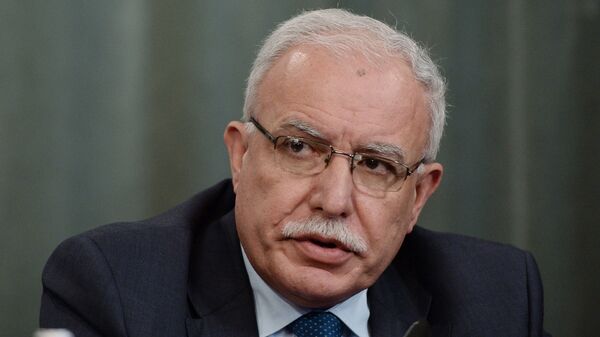"We are asking an advice of many internationally recognized legal experts to help us also to focus on different specific legal tracks and to see what could we do in the near future when it comes to this, you know, if the negotiations track is closed by the rejection of Israel and the United States, that means that they are not leaving us with many options but to focus on the legal one," Foreign Minister Riyad Maliki said.
Maliki emphasized that Palestine has signed over 100 international conventions and agreements with certain conditions on how member states should or could act.
"Absolutely, we are ready for direct talks through a third party, of course… We do not think that taking Israel for 15 minutes reunion in Jerusalem will do that. We think that this will be a disaster. We think, you know, probably, coming to Sochi or maybe to Moscow could be the right one, if Netanyahu is willing to do so, you know, it's only a flight of three hours, and he will enjoy, of course, the hospitality of president Putin and the Russian people. So, I advise the Israeli ambassador to look into it and to show the positive attitude," Maliki said.
"First of all, Israel represents an occupying power… and this is something we should really address maybe through the ICJ. When it comes to the criminal actions committed by the Israeli government then we could back to the ICC, when it comes to some actions taken by Israel like trying to sell settlement products then we will go to the European court, or to the national country courts," he explained.
Israeli Ambassador to Russia Harry Koren told journalists that Israel welcomed the earlier Russian plan on conducting a direct meeting between the Palestinian leader and the Israeli prime minister, saying, however, that the Palestinian side, in general, is "not in the mood for a direct contact" as Abbas declined to come to Jerusalem, which is 15-minutes' drive away from Ramallah, on Netanyahu's invitation.
READ MORE: Palestine Refuses to Deal With US as Sole Mediator in Mideast Talks — Abbas
Palestinian National Authority
Nabil Shaath, the foreign affairs adviser of Palestinian President Mahmoud Abbas, told Sputnik that some officials within the Palestinian National Authority were discussing the option of terminating the administration of the autonomy and let Israel bear the full attack of running the occupied West Bank.
"No, you know, the current status of the Palestinian Authority was created by Oslo agreements and was supposed to end in 1999 with moving into a full-fledged state. This did not happen, so obviously, if we want to move from where we are, we are not talking about a regression to the status, we should really talk about how we can really move closer to the state which was given to us by the [UN] resolution of November 29, 2012, 67/19, which says that the state of Palestine is under occupation," Maliki said.
"This really a discussion that continues to be heard within the Palestinian circles just to give back Israel full responsibilities of the occupation and let them really face all this financial and others security challenges," he said, accentuating that the main objective was although to "move forward" to declaring a full-fledged Palestinian state.
READ MORE: Modi Given Palestine's Highest Award for Contribution to Bilateral Ties
The Palestinian Authority, formed in 1994 a year after Israel and the Palestine Liberation Organization (PLO) reached the Oslo Accords was initially supposed to be a temporary body ruling Palestine as an autonomy for a five-year period while the final status of Palestine is settled. The body has control over civilian and security matters in urban areas and only civilian matters in rural areas.
The PLO seeks the establishment of a state on the territories of the West Bank, including East Jerusalem, which is partly controlled by Israel, and the Gaza Strip. The Israeli government refuses to acknowledge Palestine as an independent political and diplomatic entity and continues to build foundations in occupied areas, despite objections from the United Nations. Peace efforts began in the 1970s, culminating in the 2003 roadmap for peace proposed by the Middle East Quartet. Since then the two-state solution has been the main objective for mediators.




